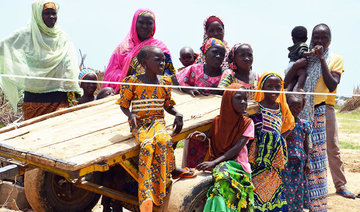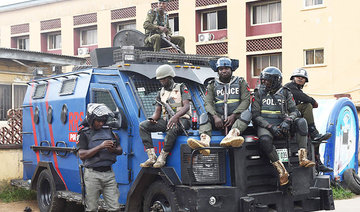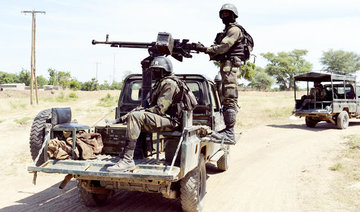KANO: More than 2,300 suspected members of the jihadist group Boko Haram were expected to appear in court in Nigeria from Monday in unprecedented mass trials to be held behind closed doors.
The defendants have all been picked up and held in detention since the start of the conflict eight years ago, which has left at least 20,000 dead in the country’s remote northeast.
To date, just 13 people have been put on trial and only nine convicted for their links to the Islamist insurgency, according to official figures.
The most high-profile current case is that of Khalid Al-Barnawi, a leader of the Boko Haram offshoot Ansaru, who is charged with the abduction and murder of 10 foreign nationals.
Nigeria’s justice ministry announced the start of the trials at the end of last month, saying four judges had been assigned and that defendants would have legal representation.
Some 1,670 detainees at a military base in Kainji, in the central state of Niger, will be tried first followed by 651 others held at the Giwa barracks in the capital of the northeastern state of Borno state, Maiduguri.
“It’s the first significant trial of Boko Haram suspects,” said Matthew Page, a former US State Department analyst and a specialist on Nigeria.
But he told AFP that while “positive” it was still a “very small step,” as many of the detainees had been held in custody for years, without access to a lawyer or ever having appeared before a judge.
How the long-awaited trials will be held also raises questions, particularly about transparency.
A justice ministry source said no media would be allowed on security grounds and that although civilian courts, they would be held in military facilities.
Umar Ado, a defense lawyer based in Nigeria’s biggest northern city, Kano, said that was “as good as denying the public the right to know how the trial is carried out.”
“It sends the wrong signal that justice is not served or the process is compromised,” he added.
There have also been questions about the ability of Nigeria’s justice system to handle so many cases at once and even of simple procedural details such as whether defendants will be tried on their own or together.
The justice ministry itself has already highlighted the potential pitfalls facing judges, such as poor investigation techniques, lack of forensic evidence and “over-reliance on confession-based evidence.”
To what extent those on trial are connected to the group will likely come under scrutiny.
“There are good reasons to believe that large numbers of the detainees have very little or no connection at all to the group,” said Matthew Page.
Amnesty International said in a damning June 2015 report that more than 20,000 people had been arbitrarily arrested as part of the fight against Boko Haram.
It highlighted appalling conditions at military detention facilities and claimed at least 1,200 people had been summarily killed and 7,000 died in custody since 2011.
The group’s spokesman in Nigeria, Isa Sanusi, said: “Nobody knows exactly how many people are detained, if they are still alive and where they are.”
President Muhammadu Buhari, who was elected in 2015, has promised to look into repeated accusations of human rights violations, including against high-ranking officers.
At least two commissions of inquiry have been established but the army announced in June this year that no action would be taken against top brass accused by Amnesty.
Such revelations have made Western countries cautious about responding to repeated Nigerian requests for more military support in the conflict, particularly in terms of weapons and other hardware.
The US administration of former president Barack Obama blocked a nearly $600 million deal with Nigeria for 12 fighter planes after a botched air strike that killed more than 100 civilians.
The deal finally went through in August.
Britain’s foreign minister, Boris Johnson, said on a recent visit that London was considering a Nigerian request for more military hardware.
Amnesty’s Sanusi believes the mass trials of Boko Haram suspects were the result of international pressure on the Nigerian government as it “desperately wants to procure arms.”















